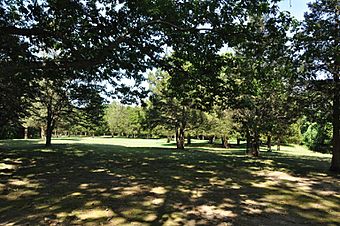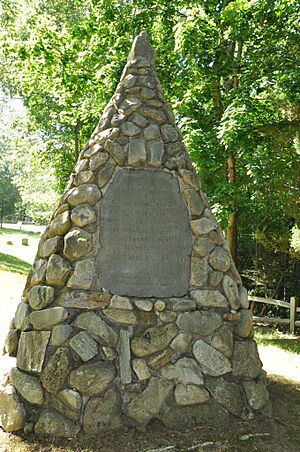Fort Shantok facts for kids
|
Fort Shantok Archeological District
|
|
 |
|
| Lua error in Module:Location_map at line 420: attempt to index field 'wikibase' (a nil value). | |
| Location | Montville, Connecticut |
|---|---|
| NRHP reference No. | 86000469 |
Quick facts for kids Significant dates |
|
| Added to NRHP | March 20, 1986 |
| Designated NHL | April 12, 1993 |
Fort Shantok is a very important historical place in Montville, Connecticut. It was the main home for the Mohegan people between 1636 and 1682. This land is also considered sacred because it's where Uncas, a famous and powerful Mohegan leader, lived and was buried.
For a long time, Fort Shantok was part of the Mohegan reservation. Later, the state of Connecticut took over the land and created Fort Shantok State Park. But in 1995, after the Mohegan tribe worked to get their land back, the state returned the park to them. Today, the Mohegan tribe manages this area as a local park within their reservation. In 1993, the grounds were recognized as a National Historic Landmark, known as the Fort Shantok Archaeological District.
Contents
What is Fort Shantok?
Fort Shantok is a special place located within the Mohegan Indian Reservation. It sits just west of the Thames River and south of the Mohegan Sun casino. The area was bought by the State Park and Forest commission in 1930. This made Fort Shantok State Park much larger.
A Sacred Burial Ground
This historic fort was also used as a burial ground. More than one hundred graves have been found here. The Mohegan people decided not to build on this land. They wanted to keep its history safe. They chose to preserve all the property. This shows how much they value their heritage.
Uncas's Stronghold
Fort Shantok is very important to the Mohegan people. It was the first place where they settled with their leader, Sachem Uncas, in the 1600s. The fort was also a strong defense for Uncas. In 1645, the Narragansett tribe attacked the Mohegans here. The fort was well-built and protected. The attack continued until English forces, led by Lieutenant Thomas Leffingwell, brought supplies. After this, the Narragansetts stopped their attack and went home.
The Leffingwell Memorial
Inside the fort, there is a memorial shaped like a wigwam. It is called the Leffingwell Memorial. An inscription on it tells the story of the attack. It says, "Here stood the fort of Uncas Sachem of the Mohegans and friend of the English; here in 1645 when besieged by the Narragansetts he was relieved by the bravery of Lt. T. I. Leffingwell."
Discovering Ancient Pottery
Fort Shantok is one of the few places in southern New England where Native American ceramics have been found. Usually, the soil, climate, and old construction make it hard for pottery to last. But here, some have been preserved. Archaeologists use these ceramics to learn about how local tribes, like the Pequots, moved around the area long ago.
 | Audre Lorde |
 | John Berry Meachum |
 | Ferdinand Lee Barnett |


